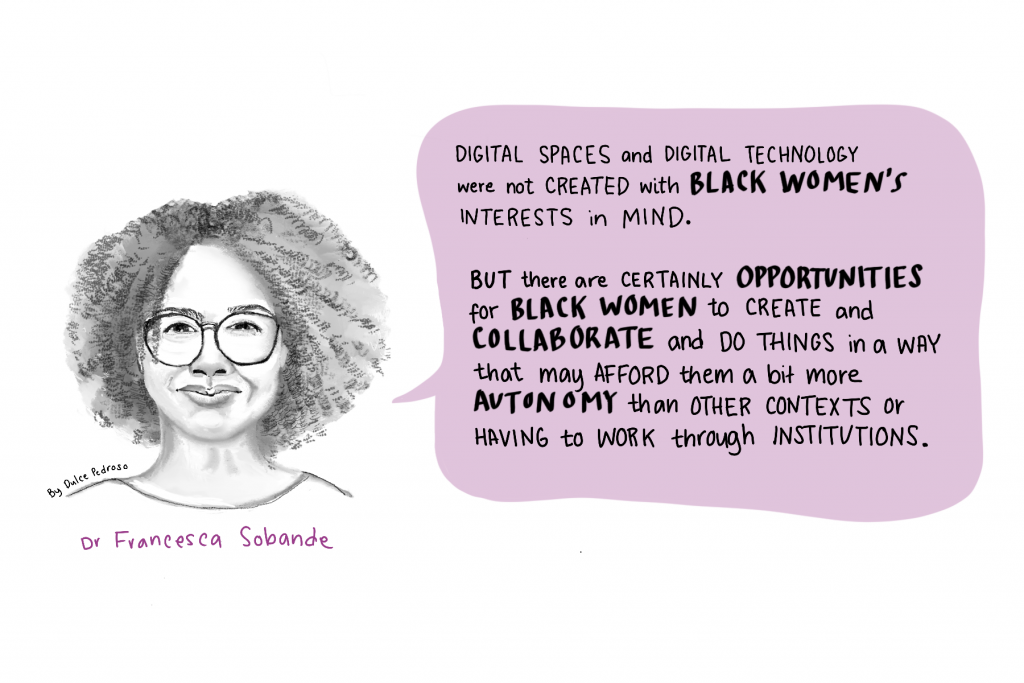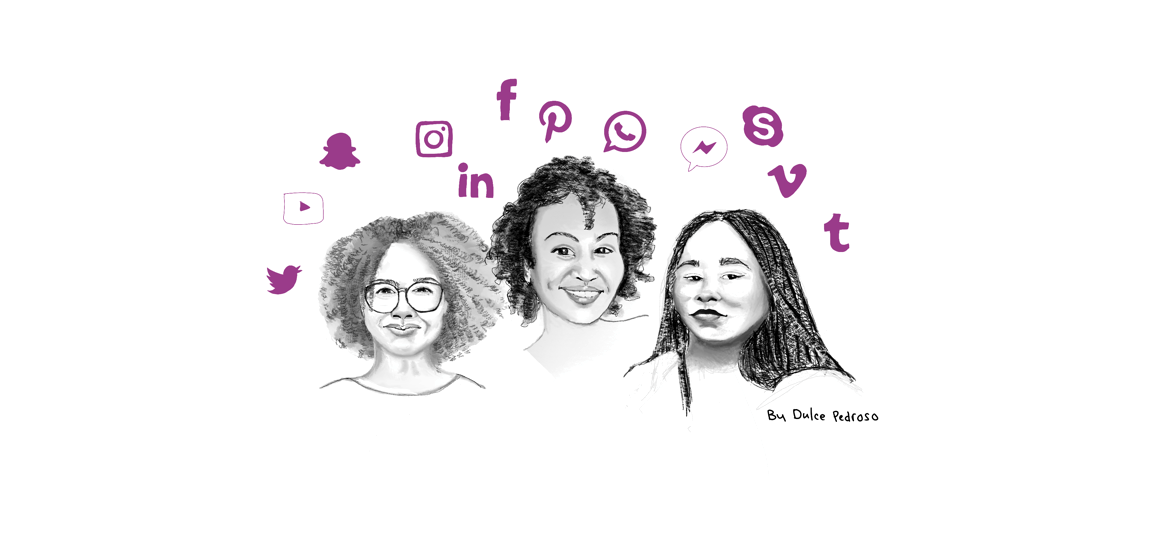It’s Black History Month in the UK – as if I needed another excuse to nerd about Black digital culture! Although I was already “Zoomed” out after a long day at the desk, I’m glad I tuned into the online conversation “The Digital Lives and Research of Black Women in Britain” hosted by the black feminist advocacy organization, Black Women Radicals. Sharing their truth were three British academics, who have researched Black women’s digital culture, identity formation in digital spaces, and digital media representation: Rianna Walcott, Keisha Bruce, and Dr Francesca Sobande, who is also an author of a book that shares the title of the event.
After comparing notes on lockdown hair braiding, the speakers were led by Jaimee Swift into a conversation about digital spaces and platforms and the role of these in Black women’s lives. I was particularly interested in their views on knowledge production and creativity, connections to the broader diaspora, and how algorithms are impacting Black women’s digital experience.
Black women’s creativity and knowledge production are on fleek!
Having often been erased from formal cultural spaces and institutions, digital platforms have offered Black women an opportunity to channel their creativity and productivity. They have been able to exist and connect without a White reference, turn the gaze inward, experience healing, and express joy. At the same time, without setting out to do so, many of these expressions have shaped our social media lexicon, gone viral, or as Keisha put it, fueled the Internet. The textbook example is the hashtag #onfleek. But, #onfleek is now less of a story about a young Black woman’s ingenuity and more of a pattern where Black people’s ideas and creations become appropriated for someone else’s gain – be it corporates or White influencers. The speakers talked about crediting, citational practices, and archiving although none of this seems to quite get to the core of the problem of exploitation and appropriation. (Though I’m hardly an influencer and it’s probably safe to say that the prospects for monetising on this blog are pretty slim, now might be a good time to credit the title of this blog ‘No Cap’ to the African American hip-hop scene, though the exact etymology is unclear to me.)
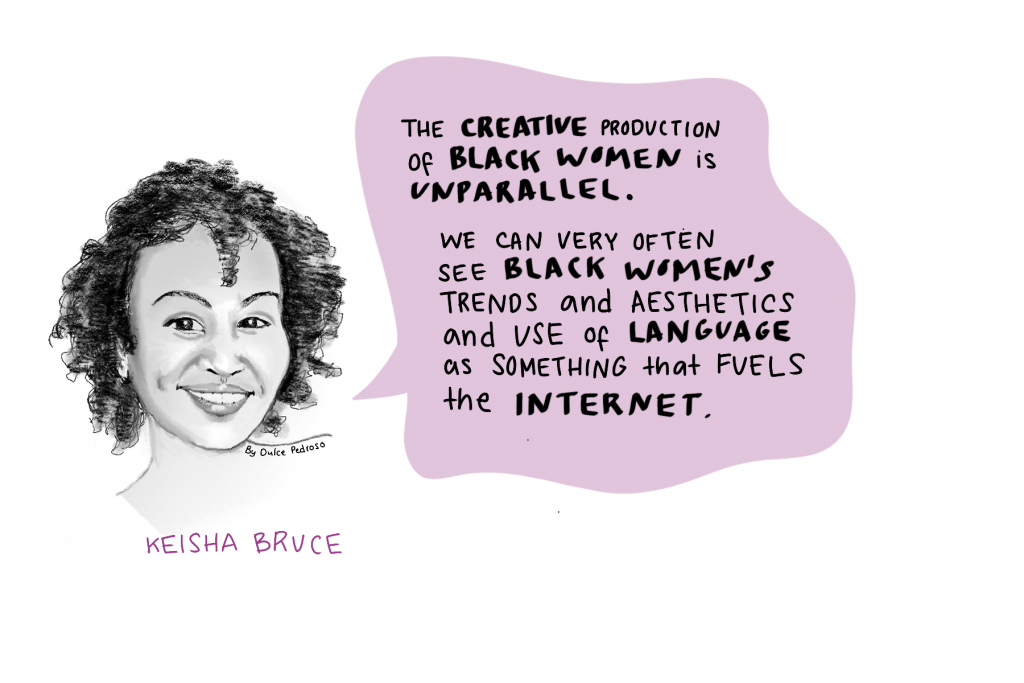
“Trying to connect…”: the Black diaspora in the digital age
Black Britons have long been stanning everything that is African American, so the lack of reciprocity in solidarity on the other side of the Atlantic has been a sore point. Yet, at the same time, Blackness in Britain itself is very London-centric. I was excited to hear Francesca address this in talking about how London-centric Blackness flattens differences: differences that are the product of the particular histories of colonialism and power in the devolved nations (Scotland, Wales, and Northern Ireland) and the former British Empire. Rianna acknowledged the limitations of just focusing on the anglophone experience and lamented the missed research opportunities in the wider diaspora.
I’m convinced that outside these centres, digital platforms have been even more vital for communal Blackness. From my own experience, I would say that a Black Finnish digital community existed before a Black Finnish community did. Being too few and geographically dispersed, and without the interest from mainstream media, I had no idea that there were hundreds and even thousands of people who shared my experience until I joined a closed Facebook group for People of Colour in Helsinki ten years ago. It can’t be a coincidence that today some of the biggest black public figures, intellectuals, and influencers, in Finland outside the music industry (though still few), were originally bloggers and podcasters. Although this event was focused on Britain, I’d love to hear more about the Black experience in, say, Wales, and compare this to the Black experience from other small nations in Europe and places that are rarely associated with the Black diaspora.
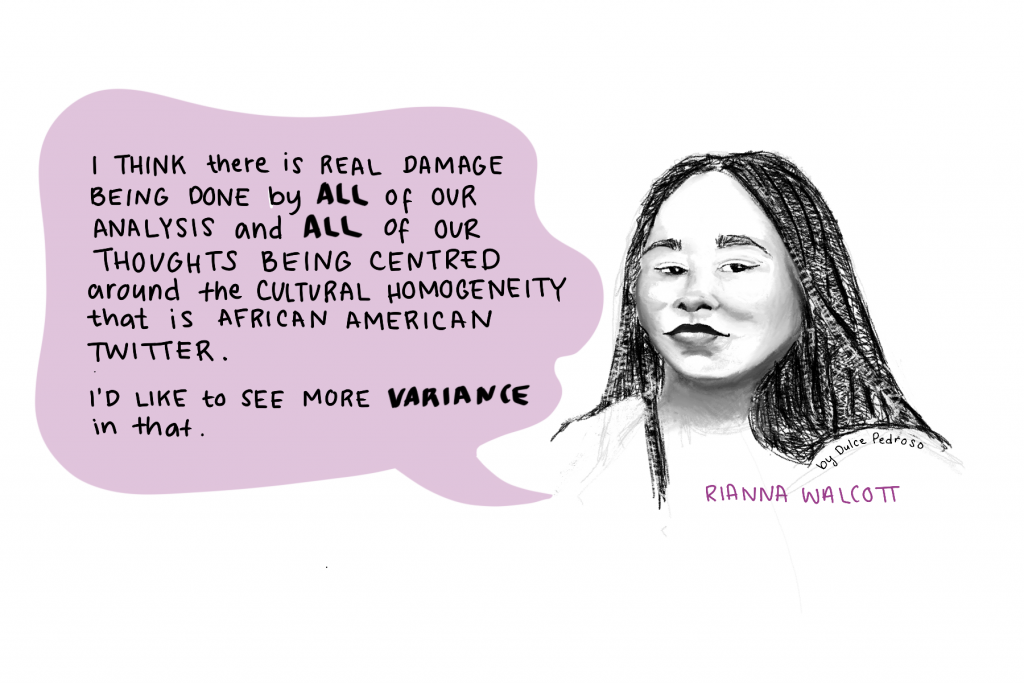
From the spotlight to the shadows
Keisha started following the #blackgirlmagic hashtag several years ago for her research on Black girlhood in Britain. She noticed that the type of content in her feed over time became dominated less by individual Black users and more by corporate ads and non-Black influencers with large followings, and who had co-opted the hashtag for its now mainstream popularity. It is not that Black users stopped using the hashtag, but that algorithms that determine our feed have a built-in bias for popularity.
Algorithms have helped Black women establish connections, find content, and get their content to the right audiences. But of course, these very same possibilities are exploited by hostile anti-Black and anti-women groups making the Internet simultaneously a threatening, unsafe place for Black women.
A less well-known phenomenon is where user content gets removed from feeds without the poster’s or the viewer’s knowledge. I only recently became aware of this, when reading comments on an Instagram post by data journalist Mona Chalabi, whose illustration of the murder of Breonna Taylor by Louisville police did not appear in all US-based followers’ feeds. Rianna signal-boosted an article by Paula Akpan about this phenomenon, known as shadow banning. The article talks about how the over 95 percent non-Black employee base of social media companies can introduce bias that leads to Black users’ content being more readily taken down for being considered as inflammatory (e.g. content using the hashtag #BlackLivesMatter).
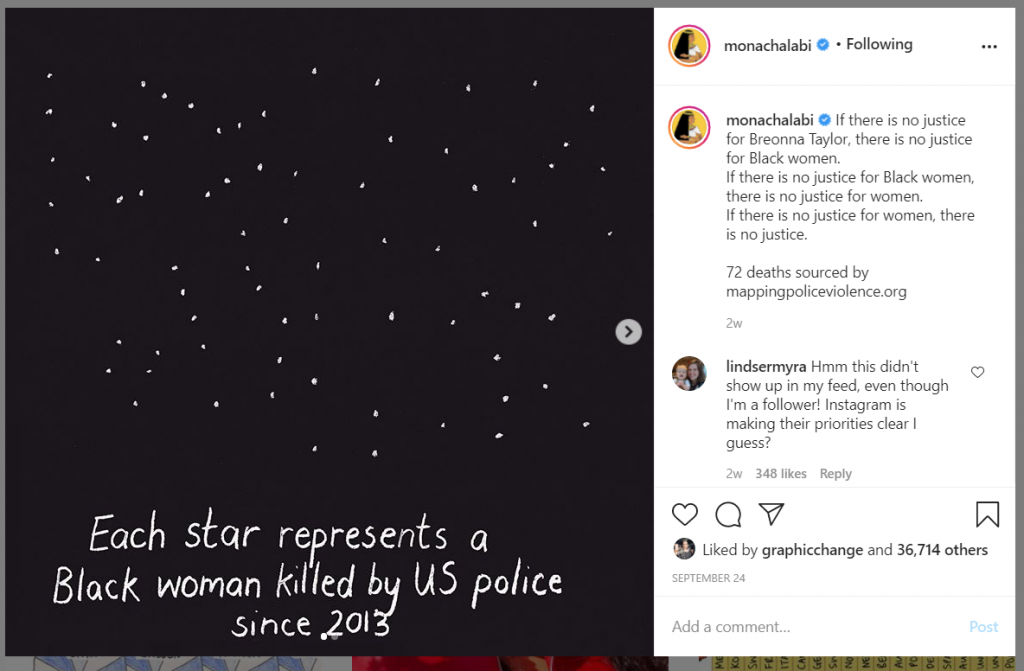
For these platforms to work for us, we need to engage more with them, both as individuals and as a community. By liking and commenting on Mona Chalabi, for example, users ensure that her posts will not be shadow banned from their Instagram feed. I’m not sure I’m ready for this pharmakon when both my body and soul are crying for a break from the digital. I already feel that all aspects of my life bar breathing are channeled through my laptop. For however on point these inspiring women are (and yes, I’m now following all of them), I don’t think I’ll be looking to them for advice on how to switch off.
